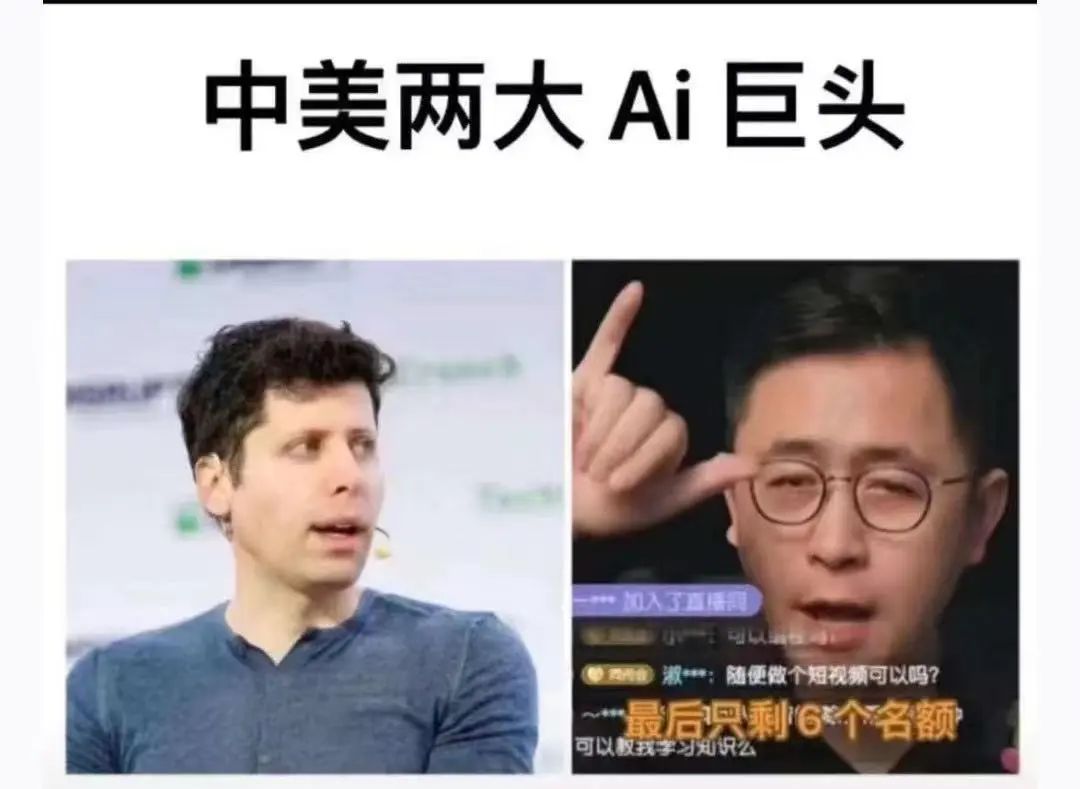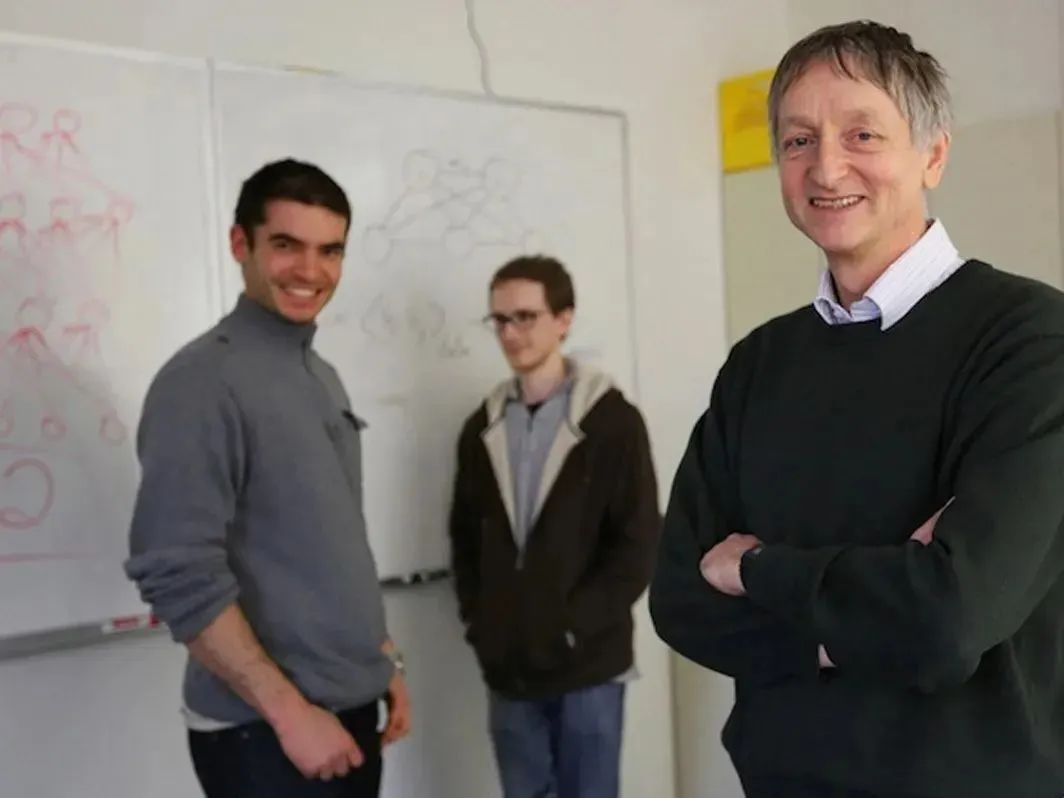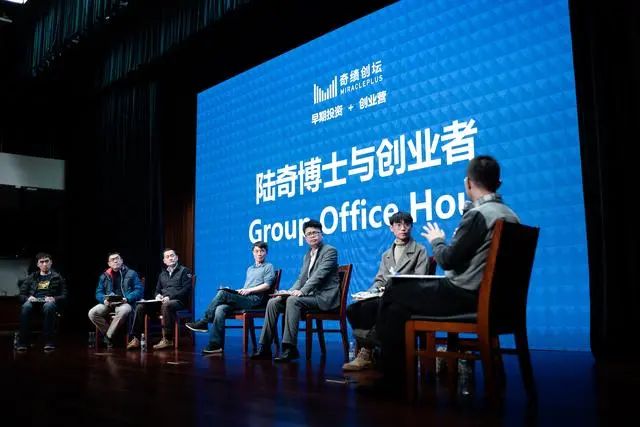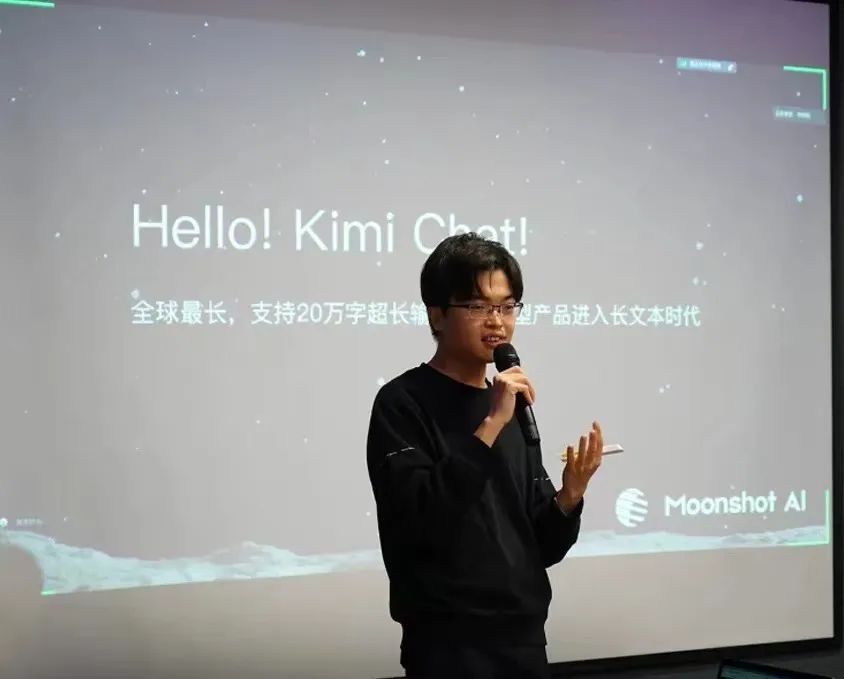Article Source: Self-limited
Authors: Cheng Xin, Luo Ji

Image Source: Generated by Unlimited AI
If you are interested in the Internet or the AI circle, you should have come across the somewhat sarcastic "two major AI giants in China and the United States" in the past few days. In an atmosphere full of irony, it seems that Chinese AI is all about "speculation" like Li Yizhou.

▲ Image Source: Internet
From any perspective, Li Yizhou cannot represent Chinese AI. So the question arises, who should be next to Altman?
Who can represent Chinese AI? This is a grand and broad topic. In the past 2023, China has no shortage of AI talents, entrepreneurs, and innovators. Representing Chinese AI does not necessarily have to be compared to Altman. Behind this question is the need for us to consider the current status of AI development in China.
From Altman, we have extracted several key characteristics: first, he is a pioneer in American AI and even global AI, a symbol of AGI, much like Musk in commercial space travel, electric vehicles, and brain-machine interfaces; Huawei in Chinese smartphones; and Ma Yun in Chinese e-commerce. Secondly, Altman is a successful entrepreneur who has led OpenAI to achieve great innovation and breakthroughs, while also having influence worldwide. Finally, he represents a kind of individual under American heroism, or rather, the ambition of an entrepreneur like a madman.
In comparison, China does not have a superpower like OpenAI, nor does it have an individual figure like Altman. However, China does have entrepreneurs truly dedicated to technological innovation, hardworking researchers, passionate innovators, and rational and calm investors.
They represent China and the Chinese AI industry, exploring our own path.
Flowing AI, Ironclad Li Yanhong
Who can represent Chinese AI?
When we asked this question to many friends, the first name that came to mind for many people was: Li Yanhong.
Even on an international scale, Li Yanhong has been named a "global AI leader" by Time magazine, alongside Sam Altman, Musk, Andrew Ng, and Huang Renxun.

▲ Image Source: Time Magazine Official Website
But what we want to talk about today is not Li Yanhong as an individual, but as a Chinese entrepreneur, how he is driving the development and universalization of new technologies.
In 2012, Baidu was at its peak. In early December, Li Yanhong, representing Baidu, participated in an auction with Google, Microsoft, and DeePMind, among other buyers. The auction item was the Sutton team, which had just challenged ImagNet with four NVIDIA GPUs: including Dr. Sutton and his two students, one of whom was Ilya Sutskever, the technical soul of OpenAI.

▲ Image Source: Internet, Ilya on the left and Sutton on the right
A few hours later, the Sutton team was eventually sold to Google for 44 million. If Baidu or Microsoft had won the auction at that time, the development trajectory of artificial intelligence might have been rewritten, and Baidu would not be as "miserable" as it is today.
Although the auction was not won, Li Yanhong and other Baidu executives witnessed firsthand how Google spared no effort in investing in deep learning. Stimulated by this, Baidu made a determined investment, starting a ten-year, billion-dollar funding support and establishing the Institute of Deep Learning (IDL).
Later, Baidu announced shocking news for the Chinese Internet industry, becoming the first Chinese internet company to fully transform into an AI technology company. At that time, the mobile internet was just taking off, WeChat had reached 100 million users, and the short video empires of Kuaishou and Douyin were emerging.
In terms of talent, Baidu was not inferior. In 2014, the head of IDL, Yu Kai, helped to invite the highly renowned scientist Andrew Ng to join, and he later left to found Horizon Robotics. In 2017, Baidu also hired Lu Qi, who had left Microsoft.
From 2016 to 2019, after AlphaGo defeated Lee Sedol, the AI 1.0 era surged, and Baidu's AI strategy was recognized for the first time. Industrialized scenarios such as facial recognition, machine learning, and autonomous driving made rapid progress.
But soon, AI technology hit a bottleneck again, and accuracy seemed to reach a dead end, disappointing the industry, with many companies going out of business one after another.
Even during the toughest three years of AI from 2019 to 2022, Li Yanhong remained a loyal believer. A lot of money was poured into autonomous driving, and Baidu Cloud also competed with Microsoft Azure, building an intelligent cloud around AI.
However, the three years of waiting were not in vain. As one of the earliest companies to discover and follow the Transformer technology route, led by Wang Haifeng, Wu Tian, and Wu Hua, Baidu's NLP team was established. Around NLP, Wang Haifeng established a speech recognition department, an image recognition department, and a knowledge graph department.
In 2021, the knowledge graph department led by Wu Tian released the knowledge-enhanced large model—ERNIE (Wenxin) 3.0, which is the predecessor of Wenxin Yiyi.
We all know the rest of the story. Of course, from an objective perspective, Baidu has fallen out of the top tier globally and does not have an absolute leading advantage or gap domestically. But it is precisely because of Li Yanhong and Baidu's persistence that the faint spark of Chinese AI is being kept alive.
Of course, what Li Yanhong can represent is only a part of Chinese entrepreneurs.
The reason why some of the public still believe that "Li Yizhou" can represent Chinese AI mainly comes from some early internet giants who, without understanding, boast about AI. After Lu Qi published a lengthy article "My Worldview of Large Models," many people followed suit with "lengthy articles," holding multiple press conferences, participating in various AI forums, inflating stock prices, and eagerly seeking new traffic in the AI era without actually doing anything concrete. This is something that Chinese entrepreneurs are particularly good at.
This is a kind of polarization among entrepreneurs, but at the same time, it represents that we will have faster internal turnover and rapid iteration.
Pragmatic AI Investors
From technical research and development to application landing, the development of any technology relies on the drive of capital.
Take the currently popular OpenAI as an example. Its earliest operating funds came from investments and donations from Elon Musk, Peter Thiel, and others. Then from 2020 to 2021, Microsoft invested a total of 3 billion US dollars in OpenAI twice, which also became an important boost for the subsequent technological breakthrough of ChatGPT.
Pragmatic AI Investors
Returning to China, the development of large model technology also relies on capital. Therefore, when discussing who can represent Chinese AI, the capital market naturally cannot be absent. When it comes to investment in the field of Chinese AI, one cannot avoid mentioning one person—Lu Qi.
In May 2023, Lu Qi gave a speech in Beijing titled "New Paradigm, New Era, New Opportunities." After that, Lu Qi's presentation was widely circulated throughout the industry.
At that time in 2023, Lu Qi's presentation became a must-read for everyone interested in entering the field of large models. Many of the viewpoints and trend judgments in this presentation later became important references for entrepreneurs choosing their entrepreneurial direction and for investors formulating investment strategies and selecting investment targets.

▲ Image Source: Qijichuangtan Scene
Lu Qi's layout of AI large models started earlier than most domestic investment institutions.
In November 2023, at the Qijichuangtan Autumn Roadshow Day, 16 out of the 55 projects selected by Lu Qi were related to the "pre-trained large model" direction, and 19 other projects were related to AI. By the end of that month, ChatGPT was officially released, becoming the detonation point of this AI wave.
After that, Qijichuangtan continued to hold many roadshows, with waves of entrepreneurs entering to receive guidance, demonstrate their projects, meet new partners, and seek new financing opportunities.
Many entrepreneurs mentioned in discussions with "Self-limited" that although very few teams that participated in Qijichuangtan roadshows ultimately received financing, outside the competitive stage, Lu Qi warmly received wave after wave of passionate and dedicated entrepreneurial newcomers in the large model industry, generously recommending more entrepreneurial projects and helping them obtain more startup capital.
Undoubtedly, in this technological wave centered around AI in China, Lu Qi has played the role of an initial promoter and evangelist, providing guidance and impetus for the development of many AI large model projects.
The reason we are so generous in praising Lu Qi is that, as a typical example, he truly represents a type of investor who is promoting industry prosperity and development through investment.
In fact, looking back at 2023, the Chinese large model investment and financing market did not lack star targets, and many leading institutions spared no expense in chasing after trends. However, in this process, the investment of many funds did not truly consider the feasibility of the projects, but rather aimed to make a quick profit by riding the trend.
A typical example is Wang Huiwen and his company "Beyond Light Years," an entrepreneur with no background in AI, who had no clear business goals but was able to complete several rounds of financing and achieve a valuation of 1 billion US dollars in less than 4 months of starting the business. Even from its founding to being acquired by Meituan, the company did not engage in any substantial business activities.
Entering the market with great fanfare and leaving in a hurry, all that is left in the end is a mess. The reason such companies were able to obtain huge investments is primarily due to Wang Huiwen, because his background as a co-founder of Meituan allowed him to attract more money, while the project itself was not actually important.
This phenomenon actually repeated in many projects later on. For example, some entrepreneurs mentioned in discussions with "Self-limited" that some institutions actually do not support startup companies investing too much in computing power, core technology, and other areas. They prefer to use related large models open-sourced from abroad to quickly launch products, acquire users, and facilitate the next round of financing as soon as possible.
However, an interesting question is, OpenAI took 7 years from its founding to the release of ChatGPT, even with the support of top global talent and full support from Microsoft. But Chinese companies were able to complete the work of others in 3 to 4 months, despite the lack of various objective conditions. This is undoubtedly a miracle from any perspective.
As a result, due to the lack of underlying resource investment, as the industry develops, people will increasingly feel the gap between China and the United States in large models. From GPT-4 to GPTs, and then to Sora, in discussions with entrepreneurs, we hear more and more entrepreneurs expressing a sense of powerlessness and beginning to lament whether China will miss this wave of AI.
In fact, this sense of powerlessness does not come from the widening gap between China and the United States, but from the difficulty in feeling the progress of Chinese AI technology. While the American AI industry repeatedly crosses technological barriers, Chinese AI still remains in mode innovation, PPT stories, and knowledge payment.
Therefore, if we truly want to feel the progress of Chinese AI and truly promote the development of the Chinese AI industry, investors also need to truly start from the perspective of industry and technology, make some long-term, future-oriented investments, and not just rely on the power of capital to tell a more appealing story.
Clearly, we need more investors who are pragmatic and realistic.
Fourth-Generation Entrepreneurs from Tsinghua
Entrepreneurs always represent the vitality of the industry.
In 2023, the large model once again sparked a wave of entrepreneurship, and countless people embarked on new entrepreneurial careers, with talent flowing into the market like "futures."
In the face of hard technology like AI, entrepreneurs are becoming increasingly elite and technical. Mentors from science and engineering schools such as Tsinghua University, Beihang University, and Harbin Institute of Technology have formed research groups, and the academic and business worlds have begun to merge, with technical experts becoming a necessary option for entrepreneurial companies.
"If you have attended several roadshows, you will find that the proportion of Tsinghua-related entrepreneurs is often very high, and they are particularly focused. Once they identify the right direction, they are determined and steadfast."
In the current star-studded entrepreneurship, founders such as Zhang Peng of Zhupu AI, Wang Xiaochuan of Baichuan Intelligence, Jia Yangqing, who joined Infra after leaving Alibaba, and Yang Zhilin, who recently received the largest financing in China, all come from Tsinghua.
They represent the fourth-generation entrepreneurs of Tsinghua.
Among them, the most familiar is definitely Wang Xiaochuan. This technological expert of the internet era, unlike Wang Huiwen, founded Sogou, sold it to Tencent, and then with investments from Lei Jun and Zhang Chaoyang, smoothly became the most resourceful elder brother among entrepreneurs.
But Wang Xiaochuan also has the typical problem left by entrepreneurs of the internet era.
Technology entrepreneurship is different from internet entrepreneurship. After 2010, most internet entrepreneurial projects were mostly about innovative models and market capture, while technology entrepreneurship often involves waiting on the sidelines, almost without considering market factors but firmly sticking to their technical direction.
After Baichuan was established in March 2023, observing its product roadmap for a year will reveal that Baichuan, which originally followed the open-source route, later began to introduce closed-source models for commercialization and quickly entered the commercial deployment stage.
"Baichuan seems to have been led along and lacks a clear focus. Whether it's large parameters or long texts, these are directions validated by the market. 2B, 2C large models, and AI applications are all things they want to do, but there is no outstanding feature." Feedback from a large model entrepreneur.
In contrast, starting in 2020, Zhupu firmly chose to become a loyal follower of OpenAI. Established in 2019, Zhupu began to discover and choose to follow the path of OpenAI in 2020. Even now, going all in on large-scale parameter large models is an extremely risky endeavor, especially in the bleak year of 2020 for AI.
However, in terms of technical direction, Zhupu did not blindly follow Google's BERT architecture or OpenAI's GPT architecture, but based on these two paths, proposed the GLM algorithm framework, which can understand while also completing writing and filling in.
Zhupu is a company composed of "Tsinghua PhDs" with CEO Zhang Peng graduating from the Department of Computer Science at Tsinghua, President Wang Shaolan being a leading innovator at Tsinghua, and Chief Scientist Tang Jie serving as a professor in the Department of Computer Science at Tsinghua University.
After OpenAI became popular, many people were looking for "China's OpenAI," and naturally, their attention fell on Zhupu. Currently, Zhupu has become a unicorn in the field of large models in China and has persisted in the closed-source route while continuously exploring commercialization possibilities.
However, both Wang Xiaochuan and Zhang Peng have lost the vitality of young entrepreneurs and have become more mature and grounded.
The new era belongs to the young people, there is no doubt about that. The opportunity has also come to the post-90s generation.
According to "Self-limited," in the new wave of large model entrepreneurial groups, 80% are post-90s, including the presence of post-00s.
Yang Zhilin from the Dark Side of the Moon represents the young generation of Tsinghua.

▲ Image Source: The Dark Side of the Moon Roadshow Scene
According to "Self-limited," it is understood that the Dark Side of the Moon is the Chinese translation of Yang Zhilin's favorite rock band, The Dark Side of the Moon. Whenever Yang Zhilin is seen at a roadshow, he exudes the spirit of a talented youth, while also radiating idealistic sentiments.
Rationality and sensibility collide in the same person. He firmly follows the long-text route, while also aiming for the vast sea of universal large model productization. His WeChat signature reads: "I'm a million different people from one day to the next." In him, one can see a shadow of Altman.
Yang Zhilin represents the current young entrepreneurs in China, struggling to drive the wheels of Chinese AI forward.
Conclusion
Looking back at the question of "who can represent Chinese AI," we will find that unlike the United States, where it is easy to find a clear and concrete person to represent the entire AI industry, it is difficult in China to pinpoint who can concretely represent Chinese AI.
But in fact, upon closer examination of each field, we will still find a group of people in each specific field who are earnestly pushing forward the development of the Chinese AI industry.
In fact, China has never lacked hardworking individuals, nor has it lacked those who work tirelessly. It's just that in this era of information explosion, this type of person who does not "seek attention" is not easily noticed, leading to the tendency to overlook the existence of such a group of people.
So, if Altman is the Statue of Liberty holding the torch in the field of American AI, then this group of people in China is more like the scattered sparks on the land of the Central Plains. Although the brightness of these sparks is not as dazzling as the torch at present, given the appropriate time, these sparks will surely ignite a prairie fire.
免责声明:本文章仅代表作者个人观点,不代表本平台的立场和观点。本文章仅供信息分享,不构成对任何人的任何投资建议。用户与作者之间的任何争议,与本平台无关。如网页中刊载的文章或图片涉及侵权,请提供相关的权利证明和身份证明发送邮件到support@aicoin.com,本平台相关工作人员将会进行核查。




